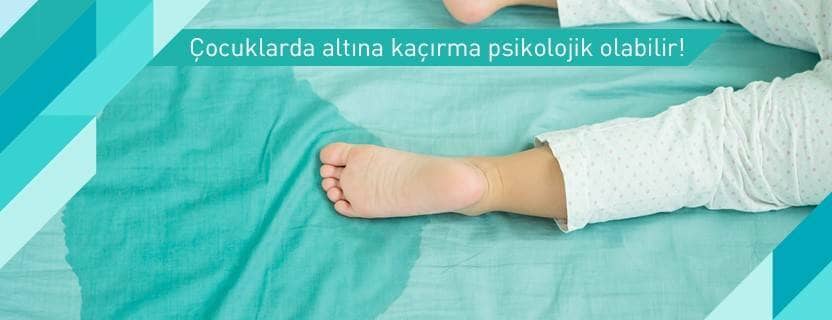
Experts stated that it is considered normal for children to leak urine at night until the age of 5.
INCONTINENCE IN CHILDREN MAY BE PSYCHOLOGICAL!
Until the age of 5, urinary incontinence in children is considered a physiological condition and is considered normal. Experts point out that there may be psychological problems under urine and poop incontinence that occur day and night at older ages.
Üsküdar University NPISTANBUL Hospital Child and Adolescent Psychiatry Specialist Assist. Assoc. Prof. Dr. Emel Sarı Gökten stated that children's incontinence at night until the age of 5 is considered normal and pointed out that this condition seen at older ages may have psychological causes.
BEWARE OF INCONTINENCE THAT OCCURS LATER
Stating that it is called "Secondary EN" when the child starts incontinence again after a period of at least one year of toilet control, Gökten said the following:
"After the age of 5, day and night urinary incontinence in children is called "Enuresis", urinary incontinence only at night is called "Enuresis Nocturna (EN)", and urinary incontinence seen both day and night is called "Enuresis Diurna". Before the age of 5, nocturnal enuresis is considered a physiological condition and is considered normal. The fact that the child has not been able to gain urinary control from the very beginning is called Primary EN, and the fact that the child starts incontinence again after a period of at least 1 year of toilet control is called "Secondary EN." While problems arising from toilet training or genetic reasons are considered in the foreground for Primary EN, psychological reasons come to mind in Secondary EN."
NEW SIBLING OR PROBLEMS AT SCHOOL MAY BE THE CAUSE
Emphasizing that if a child who has acquired toilet training starts wetting at night again, it is necessary to evaluate the psychological reasons that may affect the child, Asst. Assoc. Prof. Dr. Emel Sarı Gökten said, "Sometimes the arrival of a new sibling at home may cause regression in the child and bedwetting may start at night. In this case, the family should realize that the child is trying to adapt to the new situation, spend time with the child without worrying, play games with the child, and be careful not to interrupt the child's previous routine life. Sometimes a situation affecting the child at school, problems with friends, problems with the teacher or academic success may cause the child to start urinary incontinence at night."
Emphasizing the importance of early diagnosis and intervention, Assist. Assoc. Prof. Dr. Emel Sarı Gökten stated that children who come with the complaint of urinary incontinence should first undergo organic examinations, and if no problem is found, they should apply to the child and adolescent psychiatry unit and said, "Behavioral approaches are used in treatment, and efforts are made to inform and guide the family and the child."
AFTER THE AGE OF 4, A SPECIALIST SHOULD BE CONSULTED IN POOP LEAKAGE
Stating that poop incontinence, called "encopresis", should be evaluated if it continues after the age of 4, Gökten said, "It is considered as a physiological, developmental condition at earlier ages. When a child who has already gained poop control starts to incontinence, it is called Secondary Encopresis, and if he/she has never gained it, it is called Primary Encopresis."
THE PROBLEM WITH THE MOTHER MAY BE EFFECTIVE
Stating that it is recommended that encopretic children should be evaluated primarily by pediatric surgery, and if there is an organic problem, it should be detected and treated, Asst. Assoc. Prof. Dr. Emel Sarı Gökten said, "A child with encopresis and no organic disease is detected is examined in detail from a psychological point of view, information is provided about the communication between the family and the child and family dynamics. Encopresis is more common when the mother is depressed, or when she is angry and has low tolerance and cannot establish a healthy relationship with the child. In treatment, the child and family are involved in the process. If there are other accompanying psychiatric disorders, it is important to treat or address them as well."
